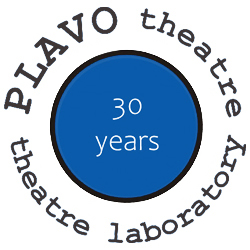 Scenario and directing: Nenad Čolić
Scenario and directing: Nenad Čolić
With: Jelena Martinović i Marko Potkonjak
Scenery and costume design: Ivana Čolić
Executive manager: Dubravka Vujinović
Poster and program design: Ivana Čolić
Text: Virginia Woolf: ’Three Gunees’, F.M. Dostoevsky: ’Dream of a Ridiculous Man’, Margaret Walker: ’For My People’ – from The Poetry of American Blacks, Friedrich Nietzsche: ’Letter to Mother’, Robert Alan Arthur i Bob Fosse: ’All That Jazz’ and personal director’s and actors’ texts
Premiere: 27.09.2013. Bielefeld, Germany
Production: Plavo theatre
Supported by: Belgrade City Council – Department for Culture, Association of Independent Cultural Scene of Serbia and Fund for an Open Society within the program Culture in protest
Festivals: Festival and symposium ’Passing the Torch’ 2013 – Bielefeld, Germany
Not so long time ago there was a country which was called Yugoslavia. That country had its coast at the Adriatic Sea. Even today, on that coast there is an island, which was once full of flowers, and therefore it was called the Island of Flowers. That island was a wonderful summer resort, a place for holidays, the most beautiful symbol of Yugoslavia, the symbol of love and a happy family life. But one day wars started between the nationalities which lived in Yugoslavia and the country started to fall apart. Soon, there was no more Yugoslavia. Simply, one country stopped to exist, and on the Island of Flowers, its most beautiful symbol, the symbol of love and a happy family life, there were less and less flowers.
Something similar happened also in a relation between men and women. That relation was once also full of flowers; it was the relation which represented the symbol of human kind, the symbol of the most beautiful relation between people, the relation of love and a happy family life. And then, one day the war started between men and women. Since then, there have been less and less flowers in that relation, and what was once the symbol of the most beautiful relation between people, the relation of love and a happy family life, became the symbol of the place where there are no more love and no more happy family life.
’The Island of Flowers’ is the performance which tells about the utopian attempt to prevent war. Which war? Any war. It is the performance which tells about the attempt to avoid the conflict. There is also a vision which makes it possible, the vision in which men and women work together for the rights of all, all men and all women, and to respect in their persons great principles of Equality, Justice and Freedom. But there are not so many of those who believe in it.
’The Island of Flowers’ is the performance which tells about the feeling of something which once existed, but which doesn’t exist anymore. It is the performance which tells about not having, about the loss, about the lack of something, about something which isn’t there anymore. ’The Island of Flowers’ is also the performance which tells about the need to return that something which was once lost, but the chances are minimal, almost non-existent. At least for this moment. Because the causes are too deep, rooted in our unconscious. And is there anything left for us to do? What there is left is a continuous initiative for projects of education, emancipation, individualization and all other activities which might be helpful in the process of integration of persons of women and equally of men. It would be very good if this performance would be recognized as such an initiative. And of course, what is left is the hope that by that time there will appear some new bloom on our Island of Flowers and that the island will blossom again. Maybe it will be in some new Yugoslavia, but this time without the ruler. Maybe then there will be no longer need for the feminist either.
Because, by the words of Virginia Woolf, ‘Our request was wider and deeper, it was a request for the rights of all, all men and all women, and to respect in their persons great principles of Equality, Justice and Freedom’.
Nenad Čolić, 2013
